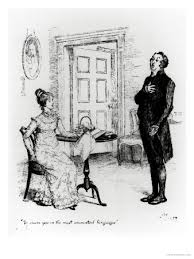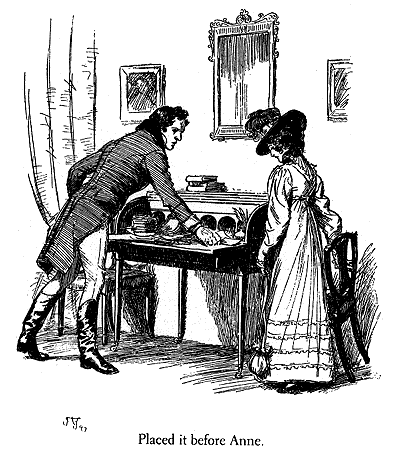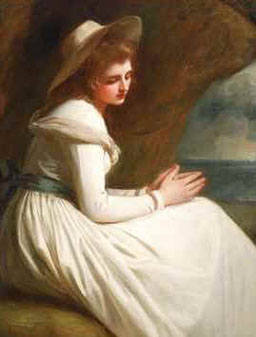Chapter 4: Pride and Prejudice
and the Beauty of Justice
One of the reasons
Pride and Prejudice is so intriguing is because it is controversial. There are those who take JA's words to her sister literally when she said the novel was "too light & bright & sparkling." But when reading these words in context it is clear that she is joking, "it wants...a long Chapter...of solemn specious nonsense."
Then there are those who see this as a serious novel in which Elizabeth must lose all of her wit and vivacity to subject herself to Mr Darcy. It is seen as JA speaking as a feminist to other enlightened feminists, showing the reader what was (but should not have been) accepted during the 1800s. Emsley says, "I argue...that the change in Elizabeth is not due to repression and humiliation, but to a liberating process of education that leads to Christian humility. Humility in
Pride and Prejudice is not abject self-abasement, but a right sense of one's own fallibility, and it is not just something Elizabeth learns in order to submit herself to Mr Darcy, but something that they both learn so that they may together submit to God in the context of Christian marriage."

Emsley goes on to say that she does see
P&P as the most serious of Austen's novels, but not on account of the French Revolution or the Napoleonic Wars, but "because it deals with the issues of courage and justice." She states, "Both the seriousness and beauty of
Pride and Prejudice arise out of Austen's concern with how to get from sin to justice. Part of the answer to the question of this process has to do with humility, part of it also has to do with anger, and most of it has to do with love."
Is love an important enough topic for a JA novel? Are readers of
P&P just escapists, indulging in a fantasy world which culminates in the perfect marriage? Although the movies may give this impression, this is hardly the theme of the book. As Emsley argues, "Tragedy is never far away in
Pride and Prejudice, and the brilliance of Austen's heroine is that Elizabeth can see the materially disastrous consequences of acting according to conscience and the good, yet she does the right thing anyway...The question of judgment and education are not frivolous, nor is the problem of how to bring about the right kind of learning. Austen's question throughout
Pride and Prejudice is Plato's question in the
Meno: 'Can virtue be taught?'"

Emsley also points out that some critics of Austen think of her as bitter and hateful, writing only with biting satire. Words in
P&P such as anger, prejudice, and judgment rub people the wrong way. Emsley says that "Anger, strangely enough, is closely tied to the practice of amiability." As Aristotle noted, the excess of amiability is obsequiousness. Mr Collins and his unbearable "arrangement of elegant compliments" is the evident example here. Emsley says, "The unfortunate Mr Collins aspires to the virtues of civility and humility, and it would be impossible to say that he falls short of them, for he far exceeds the mean in both cases...Excessive civility turns into pompous behavior." On the other extreme we have Lady Catherine.
P&P describes her thus, "Lady Catherine was generally speaking- stating the mistakes of the three others, or relating some anecdote of herself." When Elizabeth is civil towards both, she is learning to practice the virtues- especially amiability.
A key scene in the book is the first proposal scene of Mr Darcy and Elizabeth. They both attempt to be civil but lose "all compassion in anger." Elizabeth "tried, however, to compose herself to answer him with patience, when he should have done." Darcy becomes "pale with anger," but speaks to her "in a voice of forced calmness" and "with assumed tranquillity [
sic]." Emsley suggests that anger is not always a bad thing, as Darcy and Elizabeth struggled with the competing virtues of amiability and truthfulness before becoming angry, and the outburst of honesty and anger that followed was not resentful or revengeful, but brief and perhaps necessary.

Elizabeth's very next meeting with Darcy at Pemberley demonstrates that he has been practicing amiability. Emsley points out, "Righteous anger is a tremendously difficult concept, and it is next to impossible to practice in a virtuous way, and yet in the first proposal scene both Elizabeth and Darcy are justified to some extent in their anger with each other...They are trying to find the truth." Near the end of the novel, Darcy says to Elizabeth, "How you must have hated me after
that evening," Elizabeth responds, "Hate you! I was angry perhaps at first, but my anger soon begin to take a proper direction."
Another 'no, no' word is 'prejudice.' Emsley writes, "If prejudice is understood as prepossession, or adherence to principle, it is quite different, and much more acceptable, than the idea of judging adversely in advance of the situation or the facts...Good judgment always relies to some extent on prejudices in favor of the good- the difficult thing is determining when a judgment is too hastily made...Judgment involves discrimination, another unfashionable word, in order to make sure that it is good judgment. Tolerance, compassion, and sympathy invoked without limits are just as dangerous as prejudice, discrimination, and judgment made without reason."
In other words, it is not wrong that Elizabeth and Darcy make judgment calls about one another, but the timing and the way in which they do it. When Elizabeth first reads Darcy's letter, she is too angry to do him justice, but she does read it, and reading the letter, argues Emsley, is the first part of her education. When she realizes the truth about Wickham, her reaction is, "How humiliating is this discovery!- Yet how just a humiliation!- Had I been in love, I could not have been more wretchedly blind." Elizabeth does not beat herself up about it, though, once she realizes, "Till this moment I never knew myself," she begins to think of others- of Jane and Bingley.
When Darcy helps Wickham and Lydia, Emsley says, "Darcy has had to humble his pride and act with compassion, not condescension. And Elizabeth is humbled not because he has condescended to help her family, but because she feels anew the injustice of her early treatment of him."
Sarah Emsley sums up her chapter thus, "It is in the education of judgment that virtue can flourish; courage and justice and love are the serious ideals of
Pride and Prejudice...it is not an ethical manual or treatise, but a serious and comic novel of morals and manners." At the end of JA's novel, Elizabeth writes to her Aunt Gardiner saying, "I am the happiest creature in the world. Perhaps other people have said so before, but no one with such justice."
These thoughts are taken from the fourth chapter (entitled,
Pride and Prejudice and the Beauty of Justice) of Sarah Baxter Emsley's book,
Jane Austen's Philosophy of the Virtues
. Next up,
Chapter 5: Fanny Price and the Contemplative Life
 Conclusion: After Austen
Conclusion: After Austen These thoughts are taken from the Conclusion: After Austen of Sarah Baxter Emsley's book, Jane Austen's Philosophy of the Virtues
These thoughts are taken from the Conclusion: After Austen of Sarah Baxter Emsley's book, Jane Austen's Philosophy of the Virtues






 Enter Sarah Emsley. If we ever needed her it is now. She is the best I have read on the works of Jane Austen. Yes, Tony Tanner is good, he's genius at some points. Of course, Leithart is worth reading. Yes, yes, C.S.Lewis, Ian Watt, Lionel Trilling, Donald Greene, James Collins, Alain de Botton, and W. Somerset Maugham are all my favorites! I have gleaned so much from them all. But it just so happens that a lady was able to do what they were unable to. And up until Emsley, all of the women I've read on JA have been sub par. Terrible in some instances. Female literary critics (e.g., Eva Brann, Dianne Johnson, Margot Livesey, -and I know he's not a girl but- Kingsly Amis, just to name a few), who should have 'gotten it' in JA have written essays I would not force on my worst enemies. Sarah Emsley is a sigh of relief. She refutes the critics with a few deft strokes.
Enter Sarah Emsley. If we ever needed her it is now. She is the best I have read on the works of Jane Austen. Yes, Tony Tanner is good, he's genius at some points. Of course, Leithart is worth reading. Yes, yes, C.S.Lewis, Ian Watt, Lionel Trilling, Donald Greene, James Collins, Alain de Botton, and W. Somerset Maugham are all my favorites! I have gleaned so much from them all. But it just so happens that a lady was able to do what they were unable to. And up until Emsley, all of the women I've read on JA have been sub par. Terrible in some instances. Female literary critics (e.g., Eva Brann, Dianne Johnson, Margot Livesey, -and I know he's not a girl but- Kingsly Amis, just to name a few), who should have 'gotten it' in JA have written essays I would not force on my worst enemies. Sarah Emsley is a sigh of relief. She refutes the critics with a few deft strokes.